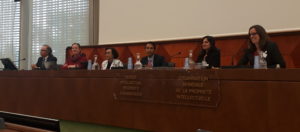
Panelists at SCCR/36 Side Event: How WIPO Can Contribute to Achieving the Right to Education (photo: Luis Villarroel)
This week, Authors Alliance is participating in the thirty-sixth session of the World Intellectual Property (WIPO) Standing Committee on Copyright and Related Rights (SCCR/36) in Geneva. Among other topics, the session is addressing copyright limitations and exceptions for educational and research institutions. Yesterday, our Executive Director, Brianna Schofield, participated in a panel discussion on “How WIPO Can Contribute to Achieving the Right to Education,” co-hosted by the Indonesian Delegation to WIPO and Education International. The discussion convened educators, policymakers, and copyright experts to share findings and practical examples of the ways that copyright laws can help and hinder classroom learning.
The panelists, representing organizations from Canada to the E.U. to Indonesia, shared the view that a robust model of copyright exceptions for education must apply to fair uses of all kinds of works (print and digital), by a variety of users (teachers, students, researchers, and institutions) for the full scope of activities that take place in educational settings.
Unifay Rosyidi, president of the Indonesian teachers’ union (PGRI), explained how for Indonesia, as a developing country, access to quality and affordable teaching and learning materials plays a pivotal role in increasing quality education. In order to facilitate this, PGRI promotes increasing access to Open Educational Resources, and also advocates for fair access to and use of copyrighted materials.
Teresa Nobre of Communia presented research showing how licenses in Europe for access to e-resources often subordinate limitations and exceptions for the benefit of license holders. Based on her research, she concluded that contractual arrangements should not be allowed to override legal provisions protecting users’ rights.
Dr. Michael Geist, law professor at the University of Ottawa, reported that flexible fair dealing provisions can enhance educational outcomes without harming publishers and authors. Despite claims to the contrary, he explained how the Canadian experience indicates that fair dealing can co-exist with a successful commercial publication market. Since Canadian reforms were enacted in 2012, there has been increased spending on copyright licensing by educational institutions and larger profit margins for publishers.
Authors Alliance referenced our advocacy in support of fair use in Cambridge University Press v. Becker, as well as subsequent analysis by Brandon Butler and David Hansen suggesting that limitations and exceptions in an educational context may in fact enhance some authors’ incentives to create by furthering these authors’ goals to advance knowledge, build reputational capital, and increase the impact of their works.
In addition to speaking on the panel, Authors Alliance also presented a statement to the Committee on the benefits to authors of reasonable limitations and exceptions to copyright for libraries, archives, and museums; education; and for persons with disabilities.
